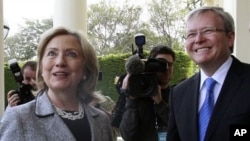The war in Afghanistan, elections in Burma and relations with China have been discussed in talks between the American and Australian governments in Melbourne. U.S. Secretary of State Hillary Clinton has asked Australians to be patient as international forces works to improve security in Afghanistan.
The annual Australia-United States Ministerial consultations (AUSMIN) security talks in the southern city, Melbourne, attracted heavyweights from both the U.S. and Australian governments. Australian Foreign Minister Kevin Rudd and Defense Minister Stephen Smith were joined by their American counterparts, Hillary Clinton and Robert Gates.
Slow progress
A range of topics were discussed, including progress in Afghanistan, where Mrs. Clinton said progress was slowly being made and urged the Australian public to be patient. Canberra has deployed 1,550 military personnel to Afghanistan.
The ministerial group also discussed Iran's nuclear program, relations with Japan and China as well as the weekend elections in Burma.
In a statement, the leaders criticized Burma's failure "to hold free, fair and genuinely inclusive elections."
A bilateral working group will also be established to look at ways for both nations to cooperate more closely on defense, as part of a global review by the Obama administration.
China
Foreign Minister Kevin Rudd, a China specialist and fluent Mandarin speaker, has also been advising his American counterparts on how to approach relations with Beijing.
Geoffrey Garrett, from the U.S. Studies Center at Sydney University, says the rise of China has also been a topic of intense discussion among the leaders in Melbourne.
"China's rise seems to be on everybody's lips," Garrett noted. "There is a concern about the U.S. engagement in Asia and how important Australia is. I think this trip tells us China is important, American engagement in Asia is important and Australia is still important."
Intermediary
Canberra is increasingly seen by analysts as an intermediary between Washington and Beijing. The visit to Melbourne by Hillary Clinton and Robert Gates has coincided with a trip by President Barack Obama to India, as Washington looks to extend its presence in an increasingly strategic region.
Clinton and Gates had earlier written, in an Australian newspaper, that United States' military presence in the Asia-Pacific region would be enhanced, reflecting worries about the rise of China.
Australia's military ties with Washington are widely considered to be the cornerstones of the country's security.
Regional Security Issues Dominate US-Australia Talks









